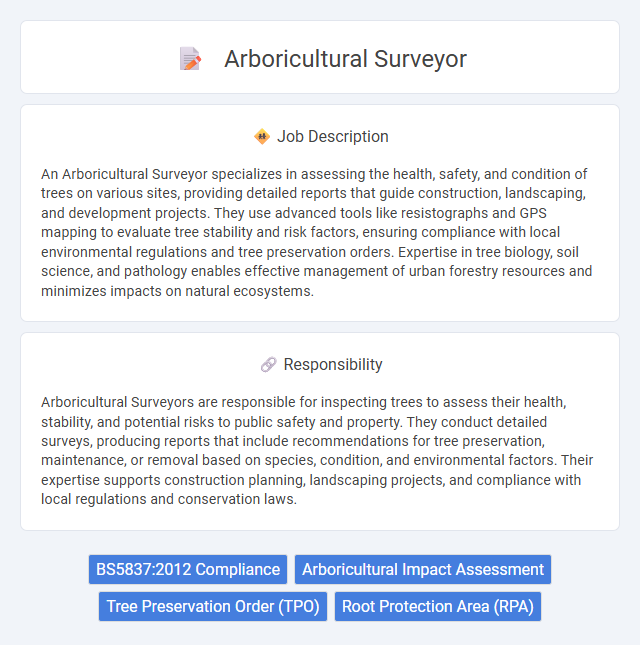
An Arboricultural Surveyor specializes in assessing the health, safety, and condition of trees on various sites, providing detailed reports that guide construction, landscaping, and development projects. They use advanced tools like resistographs and GPS mapping to evaluate tree stability and risk factors, ensuring compliance with local environmental regulations and tree preservation orders. Expertise in tree biology, soil science, and pathology enables effective management of urban forestry resources and minimizes impacts on natural ecosystems.
Individuals with a strong interest in trees and outdoor work are likely to find a career as an arboricultural surveyor suitable. Those with good physical health and the ability to work in various weather conditions may be better equipped to handle the demands of the job. People who enjoy detailed observation, data collection, and report writing might have a higher probability of success in this role.
Qualification
Arboricultural surveyors typically hold a degree in arboriculture, forestry, or environmental science, paired with professional certifications such as the Arboricultural Association's Professional Tree Inspector (PTI) qualification or Level 5 Diploma in Arboriculture. Strong knowledge of tree biology, soil science, and surveying techniques is essential for accurate tree assessments and risk evaluations. Practical experience with tree management software and familiarity with relevant legislation, including the UK Tree Preservation Orders (TPOs) and the Wildlife and Countryside Act, enhances employability and job performance.
Responsibility
Arboricultural Surveyors are responsible for inspecting trees to assess their health, stability, and potential risks to public safety and property. They conduct detailed surveys, producing reports that include recommendations for tree preservation, maintenance, or removal based on species, condition, and environmental factors. Their expertise supports construction planning, landscaping projects, and compliance with local regulations and conservation laws.
Benefit
A career as an Arboricultural Surveyor likely offers benefits such as the opportunity to work outdoors while contributing to environmental conservation. There may be potential for varied projects, from urban planning to ecological assessments, enhancing professional growth. Job stability and competitive salaries could also be probable advantages in this field.
Challenge
Arboricultural surveyors likely face the challenge of accurately assessing tree health and stability within complex environments, balancing ecological concerns with urban development pressures. The role probably demands strong analytical skills to identify potential risks such as disease, structural weaknesses, and environmental impacts. Navigating regulatory requirements while providing expert recommendations may also pose significant professional challenges.
Career Advancement
Arboricultural surveyors play a crucial role in managing and assessing tree health and safety, with career advancement opportunities expanding into senior consultancy, project management, and environmental planning roles. Expertise in tree risk assessment, soil science, and local environmental regulations enhances prospects for leadership positions and specialized consultancy. Continuous professional development through certifications such as the Arboricultural Association Registered Consultant status significantly boosts career growth and industry recognition.
Key Terms
BS5837:2012 Compliance
An Arboricultural Surveyor specializes in conducting detailed tree assessments in accordance with BS5837:2012, ensuring proper evaluation of tree health, root protection areas, and impact on proposed developments. They produce comprehensive reports that include tree categorization, risk assessments, and retention recommendations critical for planning applications and site management. Expertise in BS5837:2012 compliance supports sustainable development by balancing tree preservation with construction requirements.
Arboricultural Impact Assessment
Arboricultural Surveyors specialize in conducting Arboricultural Impact Assessments (AIA) to evaluate the effects of proposed developments on existing trees and vegetation. Their expertise includes detailed tree surveys, root protection area analysis, and advising on mitigation measures to ensure compliance with environmental regulations and planning policies. Accurate AIAs support sustainable development by balancing construction needs with tree preservation and landscape integrity.
Tree Preservation Order (TPO)
Arboricultural Surveyors specialize in evaluating trees protected under Tree Preservation Orders (TPOs), ensuring compliance with local regulations and assessing potential risks. They conduct detailed assessments, prepare reports for planning applications, and recommend preservation or removal measures to safeguard significant trees. Expertise in TPO legislation and ecology enables them to balance development needs with environmental conservation effectively.
Root Protection Area (RPA)
Arboricultural surveyors assess and define the Root Protection Area (RPA) to safeguard tree roots during construction and landscaping projects, ensuring minimal soil compaction and root damage. Precise calculation and mapping of the RPA are critical for compliance with local planning regulations and the preservation of tree health. They use specialized tools and software to delineate this zone, informing site managers of restrictions to prevent ecological disturbance.
 kuljobs.com
kuljobs.com